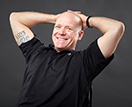 Editor’s Note: The Industry Influencers series analyzes the industry’s most effective marketing efforts and shares experts’ actionable insights.
Editor’s Note: The Industry Influencers series analyzes the industry’s most effective marketing efforts and shares experts’ actionable insights.
There are myriad career pathways in real estate, and coaching is becoming highly sought out in an industry that is constantly changing. First working as a billion-dollar-producing agent, Pat Hiban, founder and chairman of the board at Rebus University, an online training website for agents, brokers and teams, and host and founder of the Real Estate Rockstars podcast, transitioned to training and is using podcasting and blogging to reach the masses.
Real Estate Rockstars is produced three days a week and showcases a wide range of industry individuals, from veteran top agents to new, top-producing rookies, as well as coaches and successful real estate investors. Topics vary, covering everything from a guide to social media marketing to how introverts can succeed in real estate.
After being a highly successful agent, Hiban realized that what he likes to do most is help people grow.
“I don’t really sell houses anymore,” says Hiban. He still holds an active license but plans to send it back at year-end to fully commit his career to training other agents and brokers to be the best they can be.
Leveraging Cross Promotion
“I grow the listenership by writing (or paying a writer to write) blogs,” says Hiban. “I take an audio interview that I do and take notes from it and put it into words on paper. The online real estate magazines pick it up, and I also put it on our websites.”
When starting out, Hiban says his following was stalled at about 35,000 downloads for nearly two years. Since implementing the blog marketing to elevate his podcast, downloads have exceeded 150,000 per week.
“That’s almost a five-time increase in three years—very hard to do in the podcast game,” he says.
While social media plays a part, Hiban says it’s getting “harder and harder to remain effective without paying for ad spend.”
Why does this strategy work?
Hiban says promoting the podcast through blogging largely helps with SEO.
“If we do three blogs a week, that’s 156 articles with my podcast and name mentioned at the bottom. We always make the last sentence a bio with a link to our sites, and inside the blog itself, we hyperlink the episode.”
It also has to do with capturing eyeballs with a catchy headline, leading agents to click on the article, scroll and then land on the podcast.
Where do the viewers go?
According to Hiban, YouTube has been, by far, the most effective platform for his podcast, as it provides the most engagement. He has two channels under his primary account, one specifically for Real Estate Rockstars (with over 1,000 subscribers) and the other for Rebus University.
“For some reason, YouTube is a safe place to write things online,” he says. “With Facebook, people know all about you so when you make a comment, you are more exposed. With YouTube, each person doesn’t have much of a profile except their own videos, if they have any, so it seems like they are more free to engage in comments. That’s my theory.”
How can industry members get into training and podcasting?
Hiban says training, speaking and podcasting today “is sort of like trying to sell a book if Amazon didn’t exist.” So it largely depends on putting in the effort to make it something recognizable and valuable.
“There is not a widely-used platform like Amazon, currently, to sell real estate courses, even though iTunes and Stitcher radio are free to listen to,” says Hiban. “No one will know about your podcast unless it first does well, or you direct them to it. There’s no free lunch—everything requires hustle.”
 Liz Dominguez is RISMedia’s associate content editor. Email her your real estate news ideas at ldominguez@rismedia.com.
Liz Dominguez is RISMedia’s associate content editor. Email her your real estate news ideas at ldominguez@rismedia.com.











